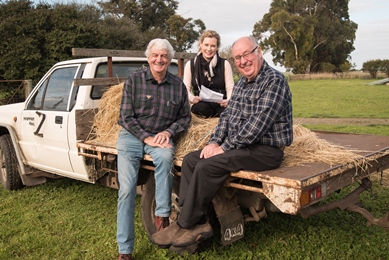11 January 2018
 People living in remote areas of Australia are 35 per cent more likely to die within five years of a cancer diagnosis than their city counterparts, so a team of researchers from UniSA’s Sansom Institute for Health Research have created a series of online videos, ‘Rural Cancer Stories’, they believe will make a difference.
People living in remote areas of Australia are 35 per cent more likely to die within five years of a cancer diagnosis than their city counterparts, so a team of researchers from UniSA’s Sansom Institute for Health Research have created a series of online videos, ‘Rural Cancer Stories’, they believe will make a difference.
Clinical psychologist and UniSA research fellow Dr Kate Fennell and oncologist Professor Ian Olver have spoken to a group of rural people who have shared their cancer stories in the hope of making other people feel more informed, less distressed and isolated and more inclined to leave home to access optimal treatment.
The project, funded by the auDA Foundation with support from the Sansom Institute for Health Research and Cancer Council SA, is a series of 2-5 minutes YouTube videos featuring cancer patients, survivors and carers that will provide online peer support to those who can’t access face-to-face cancer support groups.
Dr Fennell says that too often the unique challenges rural people face are overlooked.
“We found the need for more online, video-based, rurally-specific information and support resources when we evaluated the Country Cancer Support website that I developed with a group of rural cancer patients, during my PhD in 2012.”
“This new resource provides tips and support, spoken from the hearts of rural people who have had a variety of cancer-related experiences that we hope other country people who are faced with cancer will be able to relate to,” Dr Fennell says.
With a third of all Australians who are diagnosed with cancer living in rural or remote areas, the burden of cancer is particularly heavy in non-metropolitan communities where access to treatment and support services is limited.
Because of the additional financial, social, emotional and practical barriers country people face in accessing cancer treatment, the videos provide information on services such as Cancer Council Lodge, where people can stay while accessing treatment in Adelaide.
Cancer Council SA Chief Executive Lincoln Size says the videos will help to continue to bridge the gap in information and support service accessibility in rural and remote areas.
“Dr Fennell’s series of Rural Cancer Stories are an innovative way to help reduce the burden of cancer for South Australians living in rural and regional areas,” he said.
“It’s really important that people living in rural and remote areas are able to easily access and understand relevant information on the cancer support services available to them.
“Cancer Council SA commends Dr Fennell in her ongoing research and we look forward to working with her to deliver the project online.”
While services like the Lodge are a great help to many people during treatment, Dr Fennell says that there are also significant adjustments for both the person with cancer, and their supporters, when they leave metropolitan treatment centres and return home.
“Many people don’t feel ready or are unable to go back to living life the way they did before they were diagnosed with cancer,” she says.
“We hope that the videos may help them feel less isolated at a time when other support services can be scarce, and encourage them to adopt healthy lifestyle habits that will improve their well-being and reduce their chances of cancer reoccurring.”
Dr Fennell says she is very grateful to those who shared their stories.
“The people featured in these films are so inspiring,” she says.
“It was a great privilege and pleasure to visit their homes and help them share their valuable tips and stories. Of course, their contributions have been central to the project.
“We know their generosity will be appreciated by other country people who are faced with the challenges associated with cancer.”
The project has been modelled on a highly successful UK digital channel but will be the first of its kind focused on people in regional and rural contexts.
www.bit.ly/ruralcancerstories or search ‘rural cancer stories’ on www.youtube.com.
Media contact: Georgia Minarelli mobile: +61 413 314 726 email: Georgia.Minarelli@unisa.edu.au
Expert media contact: Dr Kate Fennell phone: 08 8302 2137 mobile: 0417 852 537 email: Kate.Fennell@unisa.edu.au


